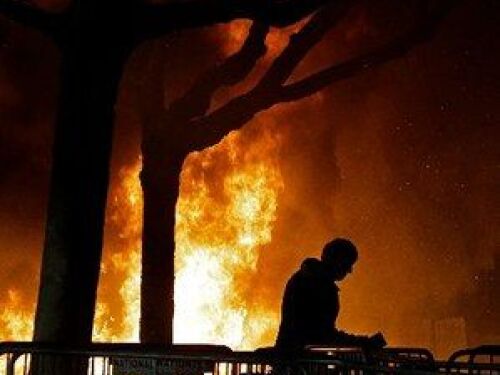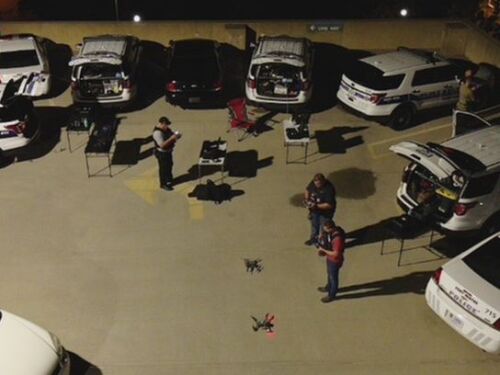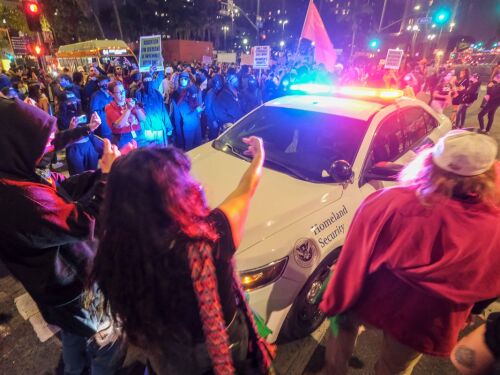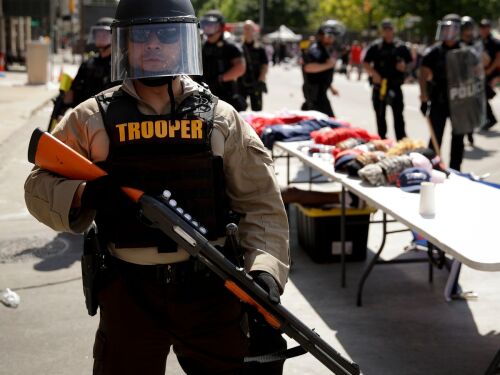I recently covered one of many college demonstrations for Police1. The specific issue the organizers were protesting is not important here. Just as I did when I worked demonstrations, I set aside my personal opinions and focused on the job.
This demonstration differed from other high-profile events that have recently dominated the news. What made it unique was that the assembly was deliberately non-confrontational and remained peaceful from start to finish.
This peaceful approach was largely due to the organizer, who delivered the group’s instructions both verbally and in writing just before the demonstration began. A summary of the organizer’s directives asked demonstrators to:
- Violate no campus rules.
- Violate no laws.
- Not possess any weapons.
- Not obstruct streets, sidewalks, or entrances.
- Not use loud abusive, or intimidating language.
- Not confront and counter-protestors.
- Not engage in disorderly conduct.
- Not litter.
- Remember that one’s bad conduct reflects badly on all.
The demonstrators followed the organizer’s rules so well that non-involved students, dressed in their graduation gowns just one block away, were able to walk toward their graduation exercises undisturbed and unconcerned.
The written rules distributed by the organizer reminded me of a crucial aspect of the most successful crowd control events I ever handled with our Crowd Control Unit: the pre-event contact with the event organizer(s).
I’ve mentioned pre-event discussions in other crowd control articles, but their importance merits a more detailed discussion here.
Reason one for the pre-event contact
The primary reason for initiating contact with event organizers before the event was to introduce myself and establish a dialogue aimed at facilitating a peaceful and orderly assembly. After building rapport with the organizer(s), I would convey the message: “Our department is committed to protecting your right to speak and assemble, and we want to help ensure your event is peaceful and positive.”
Some suggestions would be general, while others would be tailored to the specific event. If I were making such a visit to demonstrations today, my “Suggestions list for protesters” might look something like this:
1. Make a plan and obtain the proper permits.
Prepare a detailed plan for the demonstration. Once the plan is ready, contact the City Clerk to obtain the necessary permits, clearly indicating the designated time and location(s) for the event.
Follow the plan as outlined.
Note: Even a Homecoming Parade can lead to chaos and disorder if it occurs without prior planning or follows a route that hasn’t been pre-approved.
2. As a leader, emphasize the importance of maintaining a peaceful event.
Communicate the goal of peaceful conduct to attendees in writing before the event. Reinforce this message verbally at the beginning of the event and throughout its duration. As the leader, your words, actions, and example will set the tone for how the event unfolds.
3. Be vigilant for the arrival of negative informal leaders.
Stay alert for outside troublemakers who may attempt to hijack your peaceful event to advance their own agenda.
4. Enforce a mask ban.
Prohibit the use of masks at the event. A mask ban can help maintain a peaceful atmosphere, as masks have historically been associated with facilitating criminal behavior and rarely promote positive conduct.
5. Discourage alcohol and drug use.
Peaceful behavior is not a natural side-effect of either drug or alcohol use.
6. Declare a weapons possession ban.
Prohibit the possession of the following items at the event:
- Traditional weapons such as knives, guns, etc.
- Bats, sticks, and poles used to hold up signs.
- Projectiles such as rocks, ball bearings, and pool balls.
- Frozen water bottles.
- Caustic liquids and other harmful substances.
- Super-soakers that can be used to fire those liquids.
- Fireworks and flares.
7. Declare a goal of an arrest-free and injury-free event.
Encourage all participants to obey the law and avoid committing arrestable offenses just to make a point. Emphasize that arrests can lead to injuries for both demonstrators and police officers. Additionally, arrests at such events can have long-lasting negative consequences, as an arrest record can follow individuals for the rest of their lives.
8. Declare a non-confrontational event.
Advise all participants to avoid confronting or obstructing motorists, pedestrians, businesses, counter-protestors, and others going about their daily activities. Such actions can quickly turn a legal demonstration into an unlawful assembly. Moreover, because there is no way to control how others might react to confrontational or obstructive behavior, it can lead to serious injuries or worse.
9. Set a start and finish time.
Clearly establish and adhere to a designated end time for the demonstration. Sticking to this schedule helps ensure that your event concludes on a positive note.
10. Understand that the police presence is for your and the community’s protection.
Any police presence at your lawful assembly is there to protect your group’s right to assemble freely and peacefully, as well as to safeguard the peace and safety of the community.
If you have any questions, feel free to contact me at (Name and contact information).
Leave a written copy of your suggestions with the organizer and keep a copy for your records.
We can’t plan for everything. But with the right people, policies, training, and supervision in place we can best handle whatever may come our way during special events. Here’s some tips from Gordon Graham:
Reason two for the pre-event contact
This pre-event contact not only establishes a constructive dialogue with the event organizers but also provides valuable insights. The tone and content of the meeting — or even the organizer’s refusal to meet — can offer clues about the potential direction the demonstration might take. These insights can help you better prepare for an appropriate response.
Conclusion
Continue to train in the team skills that will make your crowd control efforts effective in managing crowds.
If you don’t already do so, consider making pre-event contacts with organizers of demonstrations, when possible, to not only help ensure the event is peaceful, but also to determine if the organizers have ill intentions for your community.
It is just one more tool for your protest policing toolbox that will help you plan for the best response while preparing for the worst.









